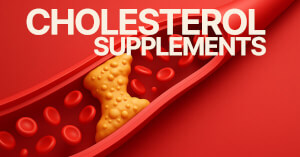
Vitamin B3 Niacin
Vitamin B3, also known as Niacin, supports cardiovascular health, helps regulate cholesterol levels, and aids in energy production.
Vitamin B3 (Niacin) is a water-soluble vitamin that supports energy production, skin health, and cardiovascular function. It comes in two forms: niacin (nicotinic acid) and niacinamide.
Niacin can help lower cholesterol and improve blood flow, while niacinamide supports skin and joint health. High doses of niacin may cause flushing, a temporary redness of the skin.
Vitamin B3 is used for cholesterol management and energy support. High doses should be used under medical supervision to avoid liver strain and other side effects.
Other names & forms of Vitamin B3 Niacin supplement : niacin, nicotinic acid, niacinamide, vitamin pp
Possible Benefits
Vitamin B3 (Niacin) functions as a precursor to NAD+ and NADP+, coenzymes essential for cellular respiration, lipid metabolism, and DNA repair.
- Supports Cholesterol Support by helping raise HDL (“good” cholesterol) and lower LDL (“bad” cholesterol) levels.
- Helps maintain Heart Health through improved blood lipid profiles and vascular function.
- Contributes to Energy & Metabolism by facilitating ATP production and cellular energy pathways.
- May support healthy skin and digestive function, linking to overall General Health.
Side Effects
Niacin (Vitamin B3) supports healthy cholesterol and energy metabolism, but it often causes a flushing reaction. Watch for:
- Facial and upper body flushing, warmth, redness, or itching, shortly after dosing
- Mild gastrointestinal upset, nausea or stomach cramps, especially on an empty stomach
- Possible headache or dizziness during flush episodes
- Temporary mild itching or tingling sensations
- Rare liver enzyme elevations with sustained-release high doses
Interactions
Possible interactions include:
- Nicotinic acid (niacin) medications: Vitamin B3 Niacin can increase flushing and blood glucose effects when combined with prescription niacin; monitor for side effects.
- Statins: Combined with statins, niacin can potentiate lipid‐lowering but also increase liver strain; check LFTs periodically.
- Gout medications: High-dose niacin can raise uric acid levels; if taking allopurinol, monitor for gout flares.
Precautions
Before using Niacin supplements, confirm none of the following apply to you. If they do, consult your healthcare provider:
- Individuals with liver disease: Niacin can cause hepatotoxicity at high doses; monitor liver function
- People with gout or high uric acid: Niacin may increase uric acid levels; use with caution
- Those on diabetes medications: Can raise blood sugar; monitor glucose and adjust treatment
- Pregnant or breastfeeding women: Use only recommended RDA doses; avoid high-dose therapies
- Patients scheduled for surgery: Discontinue at least two weeks prior, possible interactions with anesthesia and glucose metabolism
Studies
These studies provide scientific insights into Vitamin B3 Niacin benefits:
A 2013 AIM-HIGH trial in 3 414 cardiovascular patients found niacin added to statin therapy did not reduce major cardiovascular events despite raising HDL-C .
A 2014 meta-analysis of 25 RCTs reported that niacin lowers LDL-C by 15 % and Lp by 25 % but increases risk of flushing and hyperglycemia.
A 2011 RCT demonstrated extended‐release niacin improved lipid profiles but worsened insulin resistance in pre-diabetic subjects.
A 2014 HPS2-THRIVE trial showed no reduction in vascular events with niacin/laropiprant versus placebo and greater non-fatal serious adverse events .
Disclaimer: This page is for educational purposes and does not replace medical advice. If you're pregnant, have a condition, or take medication, speak with a qualified professional.
Related Articles








